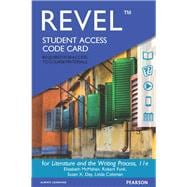Great literature is always thought provoking, always new – why not use it to improve students’ writing skills and sharpen critical thinking? REVEL™ for
Literature and the Writing Process combines an introductory anthology with detailed instruction in the writing process. By seamlessly integrating literature and composition into one multi-purpose text, the authors enable students to enjoy, understand, and learn from imaginative literature – and to write clearly and intelligently about what they have learned. Text writing assignments use literature as a tool of critical thought, a method for analysis, and a way of communicating ideas. Careful integration of rhetorical instruction with the critical study of literature guides students through the allied processes of analytical reading and argumentative writing. As a result, students learn how to write essays about the major features that are involved in interpreting short stories, poems, and plays.
REVEL™ is Pearson’s newest way of delivering our respected content. Fully digital and highly engaging, REVEL gives students everything they need for the course. Informed by extensive research on how people read, think, and learn, REVEL is an interactive learning environment that enables students to read, practice, and study in one continuous experience—for less than the cost of a traditional textbook.
NOTE: REVEL is a fully digital delivery of Pearson content. This ISBN is for the standalone REVEL access card. In addition to this access card, you will need a course invite link, provided by your instructor, to register for and use REVEL.
Contents by Genre
Contents by Theme
Preface
I. COMPOSING: AN OVERVIEW
1. The Prewriting Process
2. The Writing Process
3. Writing a Convincing Argument
4. The Rewriting Process
5. Researched Writing
II. WRITING ABOUT SHORT FICTION
6. How Do I Read Short Fiction?
7. Writing About Structure
8. Writing About Imagery and Symbolism
9. Writing About Point of View
10. Writing About Setting and Atmosphere
11. Writing About Theme
12. Critical Casebook: Joyce Carol Oates’s “Where Are You Going, Where Have You Been?”
13. Anthology of Short Fiction
14. A Portfolio of Science Fiction Stories
15. A Portfolio of Humorous and Satirical Stories
16. A Portfolio of Stories about Singular Women
III. WRITING ABOUT POETRY
17. How Do I Read Poetry?
18. Writing About Persona and Tone
19. Writing About Poetic Language
20. Writing About Poetic Form
21. Critical Casebook: The Poetry of Langston Hughes
22. The Art of Poetry
23. Anthology of Poetry
24. Paired Poems for Comparison
25. A Portfolio of Poems about Work
26. A Portfolio of War Poetry
27. A Portfolio of Humorous and Satirical Poetry
IV. WRITING ABOUT DRAMA
28. How Do I Read a Play?
29. Writing About Dramatic Structure
30. Writing About Character
31. Critical Casebook: The Glass Menagerie: Interpreting Amanda
32. Anthology of Drama
33. A Portfolio of Humorous and Satirical Plays
V. CRITICAL APPROACHES TO LITERATURE
34. Critical Approaches for Interpreting Literature
35. Critical Casebook: Reading and Writing About Culture and Identity
Glossary of Literary and Rhetorical Terms
Credits
Index of Authors, Titles, and First Lines of Poetry
Subject Index


